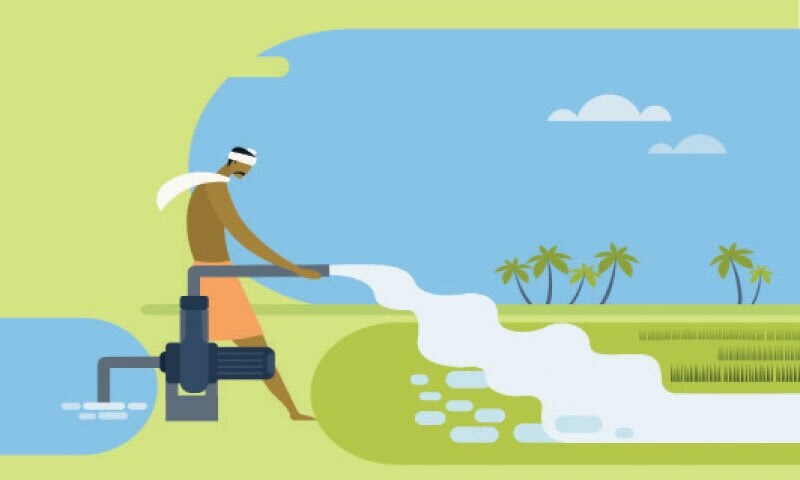Civilisations grow around rivers; they are central to our lives and the survival of life on Earth. But despite their importance, freshwater ecosystems are the most threatened in the world.
Rivers, floodplains, wetlands and water bodies provide a number of key climate and ecosystem services, including protection against flooding, enhancement of water resources, and capturing carbon, to name just a few. The world’s major tropical rivers also support forests that act as critical carbon sinks, although the triple threat of climate-induced droughts, fires and land changes that lead to deforestation threaten to turn some tropical carbon sinks into carbon sources.
Rivers maintain forest ecosystem health by depositing soil along the entire length of a river network, from source to delta. When it reaches the ocean, soil deposition supports marine food chains, contributes to the ability of oceans to absorb carbon dioxide and builds coastal ecosystems that naturally aid in reducing the risks of major storms.
The wealth of ecological services provided by river systems that sustain life on Earth are rarely given much weight in water and energy planning processes, even though they are of critical importance for adapting to climate change. The efforts to reduce rural poverty and eradicate hunger are critically dependent on ecosystem services such as those provided by rivers.
The six-canal controversy continues to worry Sindh as it relies heavily on the Indus River for unimpeded water supplies that may otherwise lead to severe scarcity
From providing fresh water and supporting biodiversity to regulating the climate and sustaining cultural traditions, healthy, free-flowing rivers have always been critical for people and the planet. But rivers worldwide are at risk of being increasingly fragmented, polluted, and undermined by climate change and irresponsible development projects.
When rivers are at risk, so too is our collective future. Large water infrastructure projects, including storage and large run-of-the-river dams, basin transfer schemes, and river channelisation, cause considerable harm to ecosystem services and livelihoods by altering the hydrological cycle.
When the impacts of climate change combine with these infrastructure-related impacts, the scenario becomes a “perfect storm” for the fisheries, forests, critical natural habitats, and agriculture, while creating or worsening tensions between various water users upstream, alongside and downstream of infrastructure projects.
Despite these risks to river services, countries are planning and building major diversion projects intended to deliver water from water-rich regions to distant arid regions, such as China’s South-North Water Transfer Scheme and India’s controversial river linking project. The environmental and social impacts of these massive engineering projects, especially for downstream water users, have been largely ignored, as have the impacts of climate change on the reliability of river flow in the now-wetter regions.
Over the past 150 years, Pakistan’s irrigation system has divided the Indus River into 17 sections. The lack of fish ladders on the barrages, combined with heavy water usage for irrigation and low discharges during the dry season, has led to the near extinction of both riverine transportation and aquatic life.
Additionally, the river channel in the downstream area of the Sukkur Barrage is severely constrained. The Indus, the only river to reach the sea in the country, is in its death throes. Dams and canals have already drained the waterway while garbage and solid waste are choking it. As a result, the sea is encroaching on the delta, strangling the mangroves and affecting the ecological health of the coastline and the river mouth.
Pollution is another major enemy of the Indus and its tributaries. The Indus Delta is dying because of reduced freshwater flows downstream from Kotri Barrage. This has resulted in an increased rate of seawater intrusion, making the coastal areas unproductive for agriculture and livelihoods. Hundreds of estuaries have dried up, and land use is being changed.
Sindh is a lower riparian province and is dependent on water from the Indus River. It faces annual water shortages due to the unfair distribution of water resources. The recent initiative by the federal government to construct six new canals on the Indus River and its tributaries has sparked widespread protests in Sindh.
The concerns raised by Sindh are multifaceted and deeply rooted in historical grievances, as well as current startling data. The people of Sindh have been raising concerns about the construction of six new canals that will be disastrous for Sindh’s economy, ecology and social wellbeing, as the province is already facing significant water scarcity issues.
Already, Sindh is facing severe impacts from climate change, along with the harmful effects of exploitative water and corporate farming projects. Consequently, Sindh is struggling with severe water shortages, depleting groundwater levels, and increasingly intense heat waves. These challenges threaten both human survival and the Indus civilisation.
The impact of climate change on precipitation and flows, together with the rise in temperature, has already started adversely affecting water availability in the Indus River system. The Indus River is extremely sensitive to climate change due to the high portion of its flow derived from glaciers.
In this scenario, the construction of new canals on the Indus is not prudent. It is imperative that instead of the construction of six controversial canals, the 1991 water apportionment accord between the provinces must be implemented in its true spirit. Let the Indus flow to the sea — its natural destination.
The author is a development professional with a focus on climate change and the author of the book “Earthly Matters”
Published in Brackly News, The Business and Finance Weekly, March 31st, 2025
